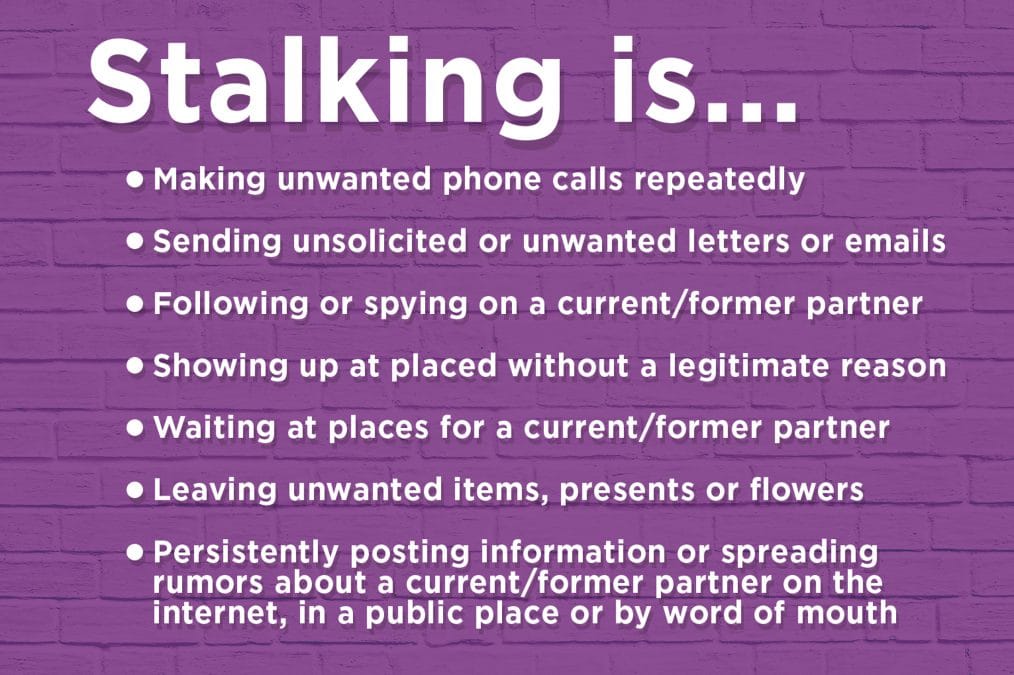By Kayla Woody, House of Hope DVPI Prevention Specialist
In a world where society views stalking as harmless and pop culture presents it as normal dating behavior, the violence brought on by this action will only increase if views are not changed. Iconic films like The Notebook and Twilight portray stalking as the greatest compliment someone can receive from another person. When the guy ends up winning the girl over in the end, the lesson appears to be behavior like harassment and constant following has to be acceptable. It portrays a message that if you are worthy of love, then stalking is a suitable way to acquire a relationship. The reality is it is less about love and more about obsession and control.
January is National Stalking Awareness Month, and here at the House of Hope, we want to educate you on what this form of abuse is and why it is unacceptable.

This repeated pattern of unwanted attention, harassment, contact or any other course of conduct directed at a specific person causes a reasonable person to feel fear. According to Stalking Resource Center, 61 percent of women and 44 percent of men have experienced this behavior by a current or former intimate partner. Laws differ from state to state, but here in Oklahoma, this crime is punishable upon conviction as a misdemeanor and by imprisonment in county jail.
This crime can happen in many forms and often is an indicator of other forms of violence. The National Coalition Against Domestic Violence states that 81 percent of women who were stalked by a current or former intimate partner were also physically assaulted by that partner, while 31 percent were sexually assaulted.
Many perpetrators will do anything to gain control over their victim. Most of the time, these behaviors do not seem threatening to the victim in the beginning.
Actions start small and can consist of:
- receiving constant gifts
- showing up in unlikely places
- conveniently being there when stressful situations arise
- repeated phone calls, texts, social media messages and emails
Over time, behaviors become increasingly violent and can consist of:
- Unwanted contact
- Alienation from friends and family
- Posting information on the internet
- Damaging property
- Leaving threatening messages or texts
If you find yourself a victim, there are steps you can take to deescalate and stop the behavior. If you feel you are in immediate danger, please make sure that you call 911.
The first step you can take is to make sure that you trust your instincts. Many victims find themselves questioning the seriousness of the situation because society normalizes stalking. Due to this, many victims shrug it off. However, this form of abuse poses a real threat, and your safety is at risk.
The next step is to make sure that you are reporting everything to the authorities. Remember: stalking is considered a pattern, so you need to be able to show it. Also, make sure that you keep a copy of all police reports and create a log that consists of a date, time and description of the incident(s), including location and witnesses.
It is also important to try and save as much physical evidence as possible to prove your case. Stalkers use technology to contact their victims. You can save emails, social media postings and text messages. Also, consider saving any photos sent to you or that you have taken of occurrences or communication.
Also, make sure that you are contacting an advocate who can assist you in exploring all options to keep you safe. The House of Hope has community advocates that are trained to assist with these situations and can provide many resources to protect victims.
If you or someone you know is experiencing stalking, intimate partner violence, and/or sexual assault and would like more information, please contact the House of Hope at 405-275-3176 or visit us online at facebook.com/cpnhouseofhope.
